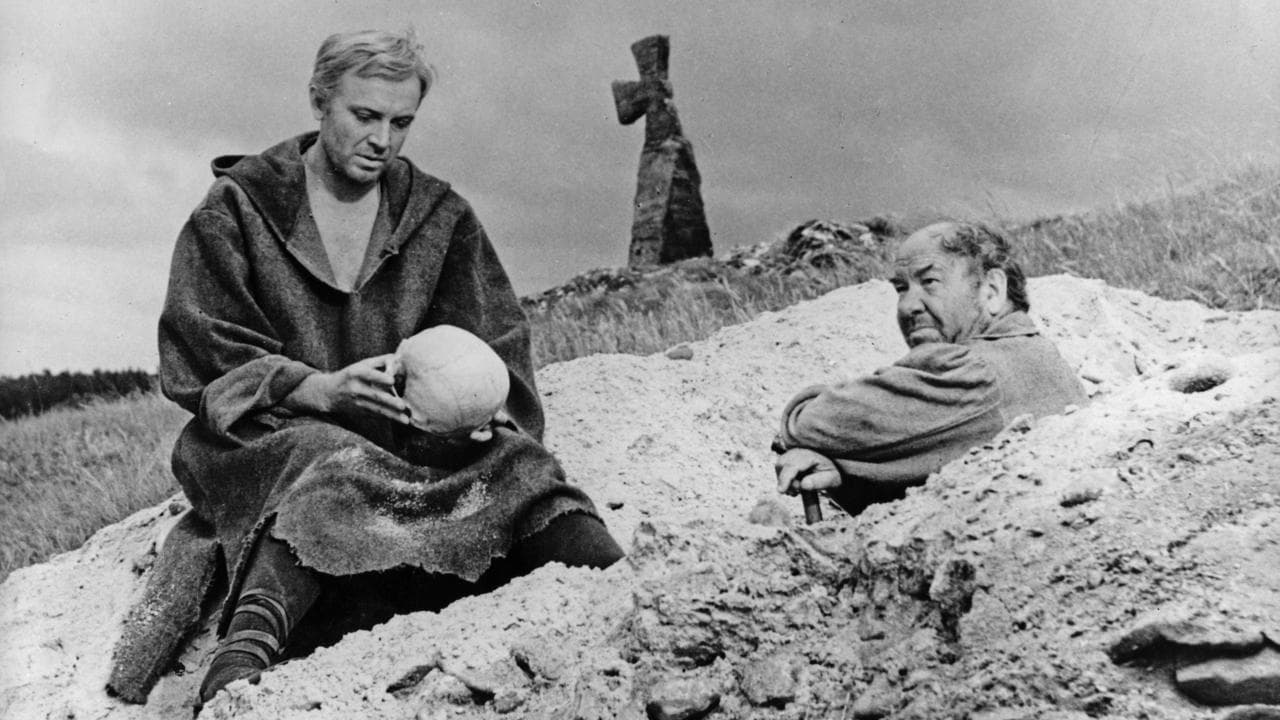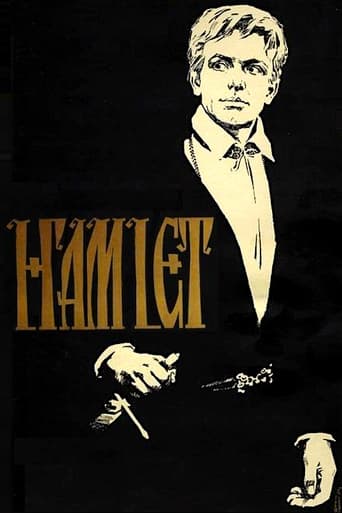



One of the best films i have seen
Excellent film with a gripping story!
Don't listen to the negative reviews
This is a gorgeous movie made by a gorgeous spirit.
View Morethe best adaptation of Hamlet. it is not exactly a verdict. or an impression. it is a profound feeling at each new discover of this special masterpiece. a film like an ice flower. the coldness. the delicate beauty. the moment of touch. it is an impressive mixture of Shakespeare and Russian soul. each as reflection of the other. each as revelation of profound truth. like an ice flower, it is only a detail from the entire picture on the window. the music of Shostakovich, the performance of Smoktunovsky, the costumes, the special sound of words, the new light and shadows of well known scenes, the emotion. it is Hamlet. the same who you knows. and the other who, like the veil - spider web of Ophelia or the air of Elsinore are a never heard message each occasion to see again the film.an ice flower. that , I believe, could be the inspired definition of this remarkable gem.
View Moreimpressive. strange. monumental. subtle. wall of music, nuanced performances, Shakespeare play heart and Slav soul. it is an adaptation but in a strange manner. because out of words and images, out of Smoktunovski performance it is small light of mystery. that is its virtue. that sparkle like descending in heart of a world of shadows and ash. and the actors, the real actors, are Sostakovici music,the Russian language, the profound feeling front to a masterpiece. it is pure delight. with cinnamon flavor and salt taste. like an ice flower. or like looniest song.it is a dark large desert in night. and, in same measure, sand rope of existence like ladder to fundamental answer about art of unforgettable search of yourself. and Elisabethan costumes completed by Mikhail Nazvanov as Claudius - alter ego for a Henry VIII Philipp II of Spain or Anastasia Vertinskaya as Ophelia - prey of spider web - veil.
View MoreThis production is an adaptation. The text has been modified. The director is trying all he can to visualize as much of the text as possible. You then have long sections of movement, action, with no speech and all the famous scenes have had their text severely reduced. What's more the film is in Russian with French subtitles. You can imagine the result: the subtitles are too fast and you can't read them, and you approach Shakespeare's text through two levels of translating. Pathetic. But the film has an originality. It is this desire to visualize things and to make us grasp a situation in one glance, at first glance if possible. The director thus privileges action, collective movements and we most of the time have some walking choreography. In other words you find the characteristics of films that were still to come like Star Wars. But I must admit we lose a lot because of the language and the general feeling is that this situational and choreographic directing erases a lot of the deep humane and frantic passion that is Hamlet's both for vengeance, the lower side of the man, and for justice, the shinier side of the man. The film, it is true, shows how the rat nest created by the disturbance brought by the rash assassination of a king by his brother and the re-marriage of the Queen with the assassin leads to the total destruction of all the active elements in this situation and the only possible regeneration coming from outside and re-establishing a new balance of power. We wonder what this film is a metaphor of or a parable for. Is he speaking of the shifting of power from one group to another, from one generation to another? Is he speaking of Stalin or Khrushchev in 1964? Does he have a more general discourse on power and how it floats from one group to the other via assassinations and violence? But then who is he speaking of? Is he speaking of the past or of the present? That's always the problem with Shakespeare because in his days kings and queens were not saints and martyrs. Queen Mary I and Queen Elizabeth I were not exactly paragons of patience and democracy, or even justice. Elizabeth I had one pamphleteer's right hand amputated because he had written a pamphlet she did not like about a prospective wedding of hers with some French nobleman. And in those days amputation was done with a butcher's hatchet and a wooden mallet to bang onto it once it had been placed on the wrist of the person who had to be standing all along. Mr. Stubbs, the right name for the role, the name of this last amputee, even took off his hat with his left hand and shouted "God Save the Queen" before fainting and falling. I have always considered it took some courage for Shakespeare to depict the extreme political and judicial practices of his time when it was not advised to criticize anything at all. And yet that's when the British Parliament managed to become indispensable in providing the ships and the sailors (both from the merchants and their guilds) and the money (from new taxes) necessary to defeat the Invincible Armada sent by Philip II of Spain, the brother in law of Queen Elizabeth I, since he was the husband of Queen Mary I, the elder half sister of Elizabeth I. I just wonder if Kozintsev was not trying to remain far away from direct political questions by being openly historical and locking himself in the past.Dr Jacques COULARDEAU, University Paris Dauphine, University Paris 1 Pantheon Sorbonne & University Versailles Saint Quentin en Yvelines
View MoreKozinstev does a BEAUTIFUL job with his Hamlet. The choice of black and white, the setting by the sea, his actors, Shostakovich's music... It's all brilliant. The interpretation of Hamlet and his motivations might seem a little sketchy at times, but the overall interpretation is far too commanding to be affected. The portrayal, especially, of Hamlet himself is , simply put, one of the best out there. Smotunovsky's controlled and deliberate performance cannot help but leave you stunned during some of his soliloquies. And in my personal opinion, anyone who has read Hamlet should have to see Kozinstev's vision of Hamlet Sr.'s ghost. SO awesome.
View More